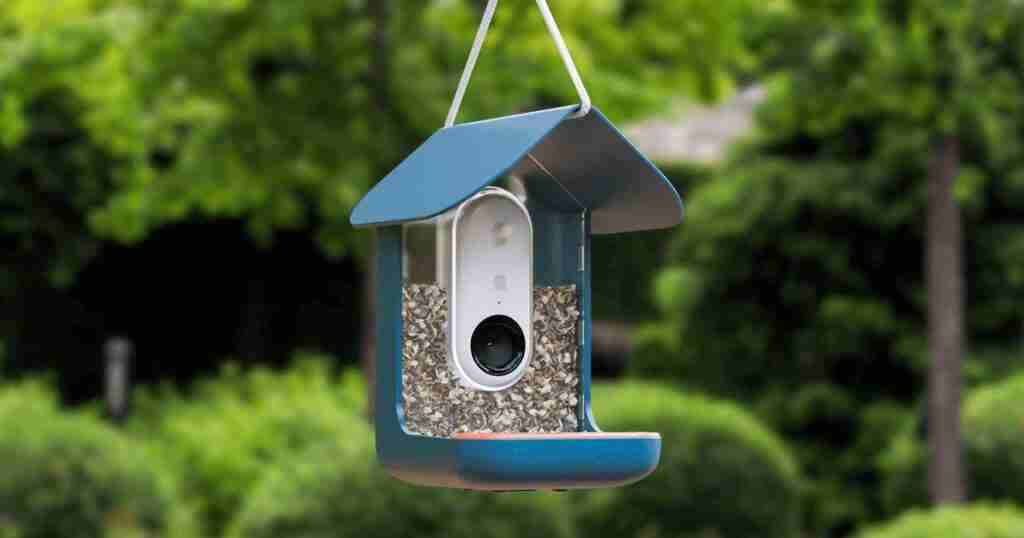Over the last few years it’s become easier than ever for a beginner to identify birds, even without a field guide. A variety of apps can analyze photos or audio of birds and offer an accurate species identification in more cases than not, especially with a quality image or recording. But these apps are generally built for on-the-go use with a smartphone. It can still be challenging to capture a warbler quickly flitting about or a sparrow belting a fleeting tune.
Now companies are integrating these technologies into “smart” devices to identify birds from the comfort of home. These always-on products are like spy tools for your yard, recording each and every bird that alights on a feeder or chips away at dawn. Below, we share our experience with two of these relatively new smart birding products: a feeder with an embedded camera and birdsong recording device.
Always Watching: Bird Buddy
Is the Northern Cardinal that visits your feeder ready for a close-up?
The Bird Buddy, a new bird feeder powered by AI technology, not only captures photos for you when it detects a bird chomping on some seed—it also identify the species and automatically sorts the images into albums. You can also get real-time app notifications when a bird arrives, after which you can view a video feed and easily share the results with friends or the larger community that uses the product.
Overall, Audubon’s tester found the Bird Buddy to be a sleek, fun product, especially suited for newer birders or gadget geeks. “Almost 50 percent of our customers are new to backyard birding,” says chief executive officer Franci Zidar. “This is kind of an entry-level product for a lot of people.”
After some easy troubleshooting during setup, we were largely impressed by the product’s high-quality photos from its 5-megapixel camera. Especially on a bright day, the Bird Buddy’s images offered an intimate view of local birds, down to the shape of a cardinal’s beak. The app is also user-friendly, and its IDs were often accurate, though far from perfect. For example, it regularly told us a Song Sparrow was a Chipping Sparrow. “Mystery visitors,” from photos the Bird Buddy’s algorithms can’t ID, offered a fun challenge—or you can try a recently introduced “ask the community” feature that crowdsources some help. (Zidar says the company is also using community feedback to improve the algorithm’s accuracy.)
The Bird Buddy requires a connection to wifi, and its battery needs a recharge every 5 to 15 days (depending on use), according to the company. If you don’t want the hassle of recharging as frequently, the solar roof add-on accessory may be a good investment (but you’re on your own for squirrel-proofing). Or you can choose to keep it plugged into an outdoor outlet. We did quickly find the app’s IDs for every Common Grackle to be a bit too much, but a recent app update after our testing offers better customization.
The device costs $249 at regular price, but is currently discounted to $199 in a “pre-sale” mode as the company works through a backlog of orders. After debuting as a wildly successful crowdfunding campaign that raised millions of dollars in 2020, the company shipped about 100,000 units beginning in fall 2022 before selling out again within months, says Zidar. The company clearly has hit a nerve, so much so that it is now fundraising to build a hummingbird feeder, too.
Always Listening: Haikubox
Want to boost your yard sightings and brush up on your birdsongs, too?
The Haikubox automatically and continuously listens for bird calls and songs, wherever it is placed. When it detects a bird, it records a short audio snippet and its algorithms will then identify the species at either high, medium, or low confidence levels. For those concerned about privacy, the device is trained to ignore human speech and most other sounds.
We found the Haikubox to be an innovative, fun, and somewhat addictive product. From the mobile app, you can customize alerts for target species or new visitors, play back the audio clips of songs, and view and sort your data in a variety of ways—all while contributing to community science efforts.
What distinguishes Haikubox from a product like the Bird Buddy is that it will detect all singing birds within range, not just those that visit feeders. It is especially suited for bird nerds who might want to run outside with their binoculars to spot a rare visitor, stay on notice for migration waves, or dive into a huge trove of data that the device will generate (which you can download).
This product’s other audience is anyone who wants to level up their birding-by-ear skills. Birdsongs can be much harder to learn than visual IDs, and using a device like this is a fantastic entry point. Like other birdsong ID apps, the Haikubox’s software did make errors: It identified some unlikely birds at high confidence levels, and it could be hard for even our resident bird expert to offer a definitive verdict after playing back the roughly three-second clips. It also sometimes got confused in the unusually noisy environment of the New York City apartment’s fire escape where we did our testing. For example, it mistook a neighbor’s “vocalizing” infant, ambulance sirens, and a passing ice cream truck’s tune for owls, crows, and loons.
But what’s more impressive is that it also got many birds right, from Red-tailed Hawks to White-throated Sparrows, and the technology will continue improving—including an update since our tests that the company says should better filter out confusing outside noises such as pets and sirens. Users can also correct misidentifications within the app, working to improve the algorithm and contribute to community science efforts (the device uses an adapted version of Cornell Lab of Ornithology’s BirdNET program). Overall, we think it may be easier to learn birdsongs alongside it—identifying chirps in the moment you hear them and replaying audio as a learning tool—than on your own.
To use the Haikubox, you’ll need to plug the device into an outdoor outlet in a spot that gets good wifi. The price ($399) includes a five-year membership, which helps the company cover cloud storage costs for all that audio. What’s truly priceless: getting familiar with the dawn chorus without leaving bed.
https://www.audubon.org/news/these-smart-devices-can-identify-birds-outside-your-window



